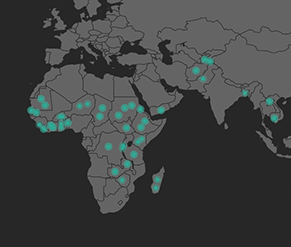This time I accompanied our donor representative on a “listening tour” in Diffa, where we sought feedback from key stakeholders — teachers, mothers, children, the Governor and Mayor of Diffa, pedagogical advisors and school inspectors.
The “listening tour” deepened my appreciation of the truly challenging but transformative work of IRC’s Niger staff. It also sharpened my sense for being more context responsive in our programming.
Supporting children after traumatic experiences
In 2016, when we began our work, we expanded IRC's Healing Classroom’s approach to embed SEL within the foundational reading and math in after-school tutoring programs.
Each instance of SEL is designed to help children experiencing trauma improve their well-being. We selected mindfulness activities as well as games to stimulate children’s thinking and social-emotional skills.
The educational activities were drawn from evidence-based tools in the West that were contextualized with a light-touch to Niger.
We also introduced a comprehensive teacher development program. Teachers participated in training, peer learning meetings and individualized mentoring. This program, though technically sound, was very challenging, as we were introducing teachers to a significant shift in their practice.
Feedback from communities sheds light on what worked and what didn’t
At the end of the first year, we held a workshop to evaluate practices based on staff and participant feedback. Teachers, caregivers and children clearly preferred the brain stimulating games instead of mindfulness activities.
Some parents felt that mindfulness activities were converting their children to Christianity while some likened it to “yoga”. There was a general mistrust of these activities and practices.
On a positive note, we learned that our extensive teacher training was highly valued. However, criticism was voiced over the additional workload and effort, the complications in logistics and high printing costs.
Now, three years later, I learn that the term “mindfulness”, which was translated into French as “L’Esprit Présent”, is also the name of an evangelical Christian radio program broadcast in Niger. No wonder that this term had raised alarms in the hearts and minds of Muslim parents in Diffa!
This raises the need for more conscientious attention to socio-cultural nuances when implementing SEL programs even when we are aiming for rapid deployment of a program.
As the for teachers, the gaps and challenges with the foundational knowledge was apparent. For example, they still struggle with correctly pronouncing letter names and letter sounds in French and with teaching more complex math concepts.
These challenges have simple, low-cost, rapid solutions. We now provide tablets that have teaching and learning materials, including curated videos from YouTube that develop teachers’ content knowledge.
Additionally, a WhatsApp group of teachers, their coaches and IRC staff was set up to facilitate discussions and share materials and video content directly and quickly. This has increased open communication and reduced the barriers between those we serve and staff.
5 takeaways from my experiences in Diffa



